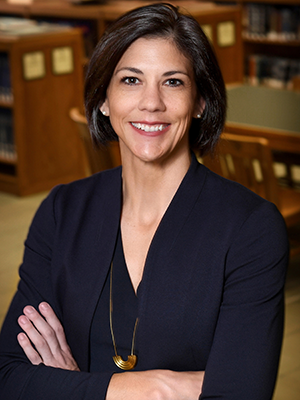From Clinics to the Classroom, Sara Hildebrand Puts People First
Even from 1,700 miles away in Wilmington, Delaware, it’s clear that Sara Hildebrand, JD’12, LLM ’22, is driven by a care for others. Her devotion to dignity is undeniable, and it’s clear that what she values is not titles or accolades – it’s her impact on those around her.
From her decision to attend the Sturm College of Law and participate in the Criminal Defense Clinic to becoming a public defender and, subsequently, a Christopher N. Lasch Clinical Teaching Fellow, Hildebrand’s career has been shaped by her relationship to others. And now, as assistant professor of law at Widener University Delaware Law School – soon to be visiting assistant professor of law at the University of Iowa College of Law – Hildebrand continues that legacy with her own students.
“My impact on individuals, and whether they feel like they have someone in their corner,” is her guiding principle through it all.
The Impact of One
Although she eventually received two degrees from the University of Denver Sturm College of Law, Hildebrand began her legal education elsewhere, envisioning a career in environmental law. Hildebrand soon discovered that “administrative law was not my thing.”
After realizing the need to change direction, “I got in touch with Professor Catherine Smith, and she encouraged me to enroll at DU.” It wasn’t until this connection – and her ultimate transfer to Denver Law – that Hildebrand fully understood what her public interest career could look like. In this case, it looked like the world of public defense.
Why public defense? “I saw potential in the legal system. I could be an actor in that system, be a catalyst of social change and equity.”
Transferring to Denver Law, where Hildebrand immersed herself in experiential learning, “was a wonderful decision.” It was also a decision that grounded Hildebrand in the human-centered approach that has informed the rest of her career. All because one person – one professor – invested in her from the start.
Chosen Family
When asked about her favorite memory from law school, Hildebrand shared, without hesitation: “Nearly all of them involve the Student Law Office, my clinic colleagues, and professors in the Student Law Office. In that community, I found so many like-minded people and kindred spirits, all of whom became friends and many of whom are chosen family.”
According to Hildebrand, “no experience in law school – and probably in my life to date – has been more positively impactful than my time in the Criminal Defense Clinic.”
Not only did Hildebrand find a sense of purpose in the clinic, she also discovered that “representing indigent people facing criminal charges was a profound, eye-opening experience that I got to see firsthand through developing relationships with my clients. Watching them experience being accused of a crime helped me see the stark realities of systemic injustice.”
In particular, “getting to know the clients was a phenomenal experience.” So phenomenal that Hildebrand still thinks about her clients to this day, and so impactful that it shaped Hildebrand’s professional identity as a client-centered attorney.
“The opportunity to represent those first clients in the clinic just felt like such an amazing opportunity and honor. And being able to do it with clinic colleagues who were willing to invest their blood, sweat, and tears in doing that too. Just to say that we gave our all in those roles was a really special accomplishment.”
In fact, “I still have a little memento of my first not guilty, and that was in a law school clinic case. Sarah Varty, my co-counsel on that case, is now one of my very best friends.”
Years later, after serving as a public defender in Durango and Arapahoe County, Hildebrand returned to the Student Law Office, home of Denver Law’s Clinical Programs and the Criminal Defense Clinic – this time as a Christopher N. Lasch Clinical Teaching Fellow, where she worked alongside and learned about clinical pedagogy from Robin Walker Sterling and Christopher Lasch, her former clinic professors, and her long-time mentor and friend, Lindsey Webb.
“To be able to learn from them how to teach students how to be criminal defense lawyers – it was almost too good to be true. A full circle moment.”
Human-Centered Work
Unsurprisingly, Hildebrand keeps in touch with many of her former students and even co-authored an article with one. Many have gone on to the public defender system; others have pursued various opportunities in public interest. Regardless of her students’ specific paths, it’s clear that Hildebrand takes great pride in them.
She also takes great pride in her human-centered work.
“I was driven to be a public defender in solidarity with underrepresented communities. And I still really feel in solidarity with those communities, so I want to continue to find ways to get involved and support them.”
For Hildebrand, this means focusing her scholarship on racial disparities in the criminal legal system. It also means getting involved inside and outside the classroom – a principle that can be traced back to her roots in the Student Law Office, her public interest work, and her time as a Christopher N. Lasch Clinical Teaching Fellow.
It can also be traced back to Hildebrand’s definition of success.
“At first you think about success as winning cases, things like that. I learned very quickly that criminal law, the criminal system, is stacked against clients and tends to de-humanize them. Really, my focus became humanizing them. And always respecting their dignity.”



